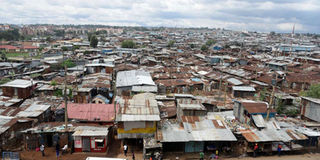Let’s not allow mistrust to get in way of Covid-19 response

Kibera slums. Experts now worry that with areas that are congested and those that carry most of the urban poor now reporting Covid-19 cases, the risk of community transmission is even higher. PHOTO | FILE | NATION MEDIA GROUP
What you need to know:
- All the actors should start by giving a voice to community-based groups to own and participate in Covid-19 communication campaigns.
- Demonstrate that you listen to the residents and respond to their needs.
- Collect more information on perceptions around the disease to detect and curb threatening rumours and myths before they spread.
The Covid-19 pandemic has brought Kenyans together to fight a common enemy. They recognise the coronavirus as a cunning and invisible enemy that threatens our health, our livelihoods and our security.
The coronavirus does not discriminate; nobody is immune from it. But we know it thrives among the vulnerable and those who cannot afford to observe social distance or isolate.
In Kenya, 56 per cent of the urban residents live in densely populated informal settlements without easy access to basics such as an income, water or food. More than four million people have no way of escaping possible exposure to the virus. This is unjust and prejudicial.
The government has acknowledged the special danger posed to such communities. As part of the Ministry of Health task force on informal settlements, I have seen this first-hand. But a threat to the impressive, united front in the fight lurks: Mistrust between the government and these communities.
The government response is doing all the right things and communicating in the right ways. But there are two major problems in how its response is perceived, especially in informal settlements.
The first is rumours and myths. Too many times, I get to hear disbelief or scepticism from community members in Kibera and Mathare, where my non-profit Shining Hope for Communities (Shofco) is in the frontline of Covid-19 response. Responses include coronavirus is not real; it’s a government scheme to get money; the government is suppressing numbers; and the government is not telling the truth.
People who live in such denial become a threat to themselves and others. Much like a virus, the spread of false information and conspiracies can wear people down and ‘infect’ them over time. We should not allow such information to spread and, hence, undermine an effective Covid-19 response.
For many people living in the informal settlements, a feeling of neglect leads to mistrust of authority. People believe mostly what they are told by trusted sources, especially friends and leaders in their community. Government actors must work with these sources to decentralise the Covid-19 communications lest rumours and fake information continue to pose a growing threat.
The second problem is subtler. There is a feeling that the government doesn’t help the residents because it cares but that it sees them as a threat. As long as this tension persists, any response effort that comes as a top-down directive will be met with resistance and suspicion. This is especially true for measures that restrict movement or behaviour.
However, these problems have simple but powerful solutions. All the actors should start by giving a voice to community-based groups to own and participate in Covid-19 communication campaigns. Demonstrate that you listen to the residents and respond to their needs. Collect more information on perceptions around the disease to detect and curb threatening rumours and myths before they spread.
Let’s not allow the legacy of mistrust to get in the way of an effective Covid-19 response. Only with the right information will all Kenyans have a fighting chance against the pandemic.
Mr Odede is co-founder and CEO of Shofco. [email protected].





